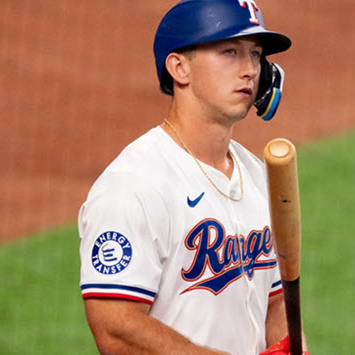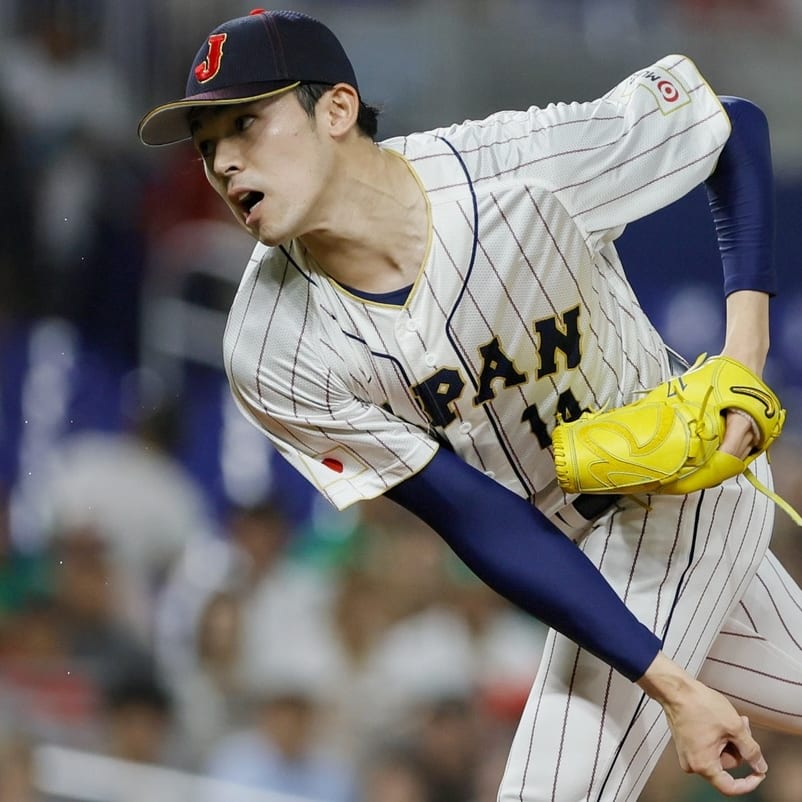This article is part of our Circling the Bases series.
Should we consider trends with players? Of course we should. However, paying attention to the correct trends is the best way to receive the proper results. We often turn to first and second half splits when analyzing players. Should we? Mark Trumbo will be our test case.
SECOND HALF FADE?
Here we go again. Mark Trumbo went 0-for-4 Monday as he left four guys on base and as his batting average dipped to .235. I say here we go again because of a troubling trend that continues to vex.
I'm not going to sit here and tell you that an arbitrary date, like the All-Star Break, is some defining line for a season. It's not. We use it for the sake of comparisons because it's a natural break point. However, there's no logical reason that a player should be one guy on July 6th, but a totally different guy on July 22nd every year. That means that folks who point out first and second half splits might be taking things to a level that really doesn't accurately portray what is happening – i.e. like we can discern some trend that makes Player A a first half player or Player B a second half option. Before I break down Trumbo, let's take a look at Mr. Second Half, Adam LaRoche.
LaRoche has always been known as a second half performer, so much so that we're often fine with overlooking a poor first half performance because we "know" he will
Should we consider trends with players? Of course we should. However, paying attention to the correct trends is the best way to receive the proper results. We often turn to first and second half splits when analyzing players. Should we? Mark Trumbo will be our test case.
SECOND HALF FADE?
Here we go again. Mark Trumbo went 0-for-4 Monday as he left four guys on base and as his batting average dipped to .235. I say here we go again because of a troubling trend that continues to vex.
I'm not going to sit here and tell you that an arbitrary date, like the All-Star Break, is some defining line for a season. It's not. We use it for the sake of comparisons because it's a natural break point. However, there's no logical reason that a player should be one guy on July 6th, but a totally different guy on July 22nd every year. That means that folks who point out first and second half splits might be taking things to a level that really doesn't accurately portray what is happening – i.e. like we can discern some trend that makes Player A a first half player or Player B a second half option. Before I break down Trumbo, let's take a look at Mr. Second Half, Adam LaRoche.
LaRoche has always been known as a second half performer, so much so that we're often fine with overlooking a poor first half performance because we "know" he will be better in the second half. Just take a look at his career splits which seem to show that he is indeed a better second half hitter.
Pre All-Star: .248/.326/.440 with a homer every 24.5 ABs
Post All-Star: .289/.350/.527 with a homer every 18.1 ABs
Clearly the prevailing wisdom is correct, but...
Have you noticed that LaRoche is batting .171 with a .637 OPS in 20 post All-Star games this season? Even if history shows LaRoche to be more productive in the second half, that doesn't mean he will be more productive every year. A guy could be a "second-half hitter" with a .250 first half mark, an a .300 second half mark. However, what if he's been in the league three years and what if he's hit .250, .250 and .350 in those three second halves? His overall numbers say he's a .300 hitter in the second half, but in two of the three years he's been exactly the same player he always is in the first half, so be very carely with sample sizes. The bottom line is that the All-Star break is arbitrary and it cannot tell the whole story, it's merely an interesting guide to use when the sun is setting behind the mountains but it's not quite dark outside yet.
Back to Trumbo...
I'm afraid, even given my little digression, that Trumbo is starting to look an awful lot like the anti-LaRoche (if you could combo First Half Trumbo with Second Half LaRoche...). Here's the scoop on Trumbo.
2011
1st Half: .260/.305/.483
2nd Half: .247/.275/.469
2012
1st Half: .306/.358/.608
2nd Half: .227/.271/.359
2013
1st Half: .245/.312/.474
2nd Half: .198/.245/.365
CAREER
1st Half: .268/.324/.518 with a HR every 15.7 ABs
2nd Half: .226/.265/.397 with a HR every 23.5 ABs
As I've already noted, I think we can read a bit too much into 1st/2nd half splits. At the same time how can we possibly ignore the data with the Angels' slugger? The answer is you're a fool if you do. Until Trumbo proves differently, you are are well within your rights to be nervous about his second half performance, and you have every right to be bordering on panic right now.
Let's face facts with Trumbo. The fact is he's a flawed hitter. Period. Through more than 1,500 at-bats the guy is a .252 hitter. Moreover, since his career began his average is worse than what the average performer in the American League has done (.257). Trumbo owns a .301 career OBP that is .021 points below the AL average during his career. Trumbo owns a .470 SLG with is better than the league average (.409), but he's only .040 points clear in OPS at .771. Yuckarama. Trumbo has improved his BB/K rate each season, but that's not that hard when your building off of horrific (0.13) and slowly increase the mark to poor (0.33 this season). He never gets on base as his sickly .301 OBP proves. He's also stolen seven bases over the last two seasons after swiping nine in 2011. He's not going to help you out there either.
The one thing he does well is produce big flies and drive runners in. Because of his terrible OBP he's only been able to score 65 and 66 runs the past two years, a total he will surpass this season since he's already scored 62 times. He's not exactly a runs machine.
Trumbo hit 29 homers as a rookie. He hit 32 in year two. This season he has 25 in 117 games and is on pace to challenge that mark of 32.
Trumbo drove in 87 runs as a rookie. He drove in 95 in year two. This year he has 73 RBI putting him on pace to produce just about 95 RBI this season.
Trumbo is a solid run producer with big time power. He hits the ball as hard as anyone in the game. He qualifies in the outfield and at first base which is a nice little booster for his value. At the same time he's not a base stealing threat, his batting average seems more likely to hurt you than help you, and therefore he's fairly limited in the fantasy game. What you see is what you get, though there's nothing wrong with a guy who can go .250-30-90 year after year. There's just no reason to think he'll be taking the next step anytime soon, especially since he's thus far been unable to sustain a consistent level of production over the course of an entire season.
BY THE NUMBERS.
.185: The batting average of Evan Longoria over his last 33 games. For a player of his talent level that's pretty astounding. He's barely keeping that OPS at the .600 level as well, and that's flat out scary. Injury to blame perhaps? Regardless he's tanked after a solid start to the year. He still has more homers than David Wright (22 to 16), more RBI than Ryan Zimmerman (62 to 55) and more runs than Kyle Seager (67 to 64).
1: The number of loses suffered this year by Blue Jays' closer Casey Janssen as he allowed four runs while recording only two outs. He's still got a solid 3.32 ERA and that 1.00 WHIP shines as he's converted 21 of 24 saves chances. That's two straight outings that he's allowed a run, but he should have some job security. Still, keep an eye on the finally healthy Sergio Santos. You know, the guy who saved 30 games with 92 Ks in just 63.1 innings in 2011? Santos was brought to Toronto to close, but he lasted only five innings last season due to injury. This season he's only tossed 9.1 innings he he's allowed a total of four hits and one walk while striking out eight.
1: The number of hits that Kenley Jansen has allowed over his last 10 outings. He's also not allowed a single walk while striking out 18 batters over 9.1 innings. He actually threw a perfect game retiring 27 straight batters.
2: The number of victories that Eric Stults has in each of the first four months of the season. Overall he's 8-10 though as he's had a hard time earning "W's" even though he's sporting a solid 3.50 ERA and 1.20 WHIP on the year. Like many hurlers he's really enjoyed pitching at home as well as he's 5-2 with a 2.37 ERA and 0.93 WHIP in 11 starts at Petco this season.
5: The number of earned runs that Cole Hamels has allowed in his last four starts. Hamels has lowered his ERA from 4.58 to 3.65 over his last eight starts as he's allowed a total of 13 runs in those trips to the hill. Did you keep the faith in Hamels or did you panic when he started slowly? Oh, his record his still abysmal, he's just 5-13, but he's closing in on many of the career levels of production that we are used to.
2013: 3.65 ERA, 1.19 WHIP, 7.96 K/9, 3.56 K/BB
Career: 3.37 ERA, 1.14 WHIP, 8.48 K/9, 3.77 K/BB
12: The number of hits that Billy Butler has in his last 25 at-bats. He's pushed his OPS up to .809 and his average to .286. Hopefully you didn't panic and sell low early on when he struggled.
31: The number of homers that the Pirates' Andrew Lambo has hit this season in a mere 117 games to tie for the minor league lead. Yeah, that's big time production. He's also driven in 97 runs while hitting in the .280's. Lots to like here in NL-only leagues. Still, some concerns are obvious. If he gets off to a slow start does he stick in the big leagues? Second, dude has 123 punchouts and just 43 walks in 117 games. That doesn't exactly sound like a guy who has total control of the strike zone. Third, and this is most telling I believe, the guy has 31 homers in 117 games this season but prior to 2013 he had a total of 74 homers over 552 games. Where did this power surge come from? Can he sustain it? After all he's hit .234 with a .761 OPS and 20 homers in 451 at-bats at Triple-A, not exactly an elite level of production.
Ray Flowers can be heard daily on Sirius/XM Radio on The Fantasy Drive on Sirius 210 and XM 87, Monday through Friday. Ray's analysis can be found at BaseballGuys.com and his minute to minute musings can be located at the BaseballGuys' Twitter account.










